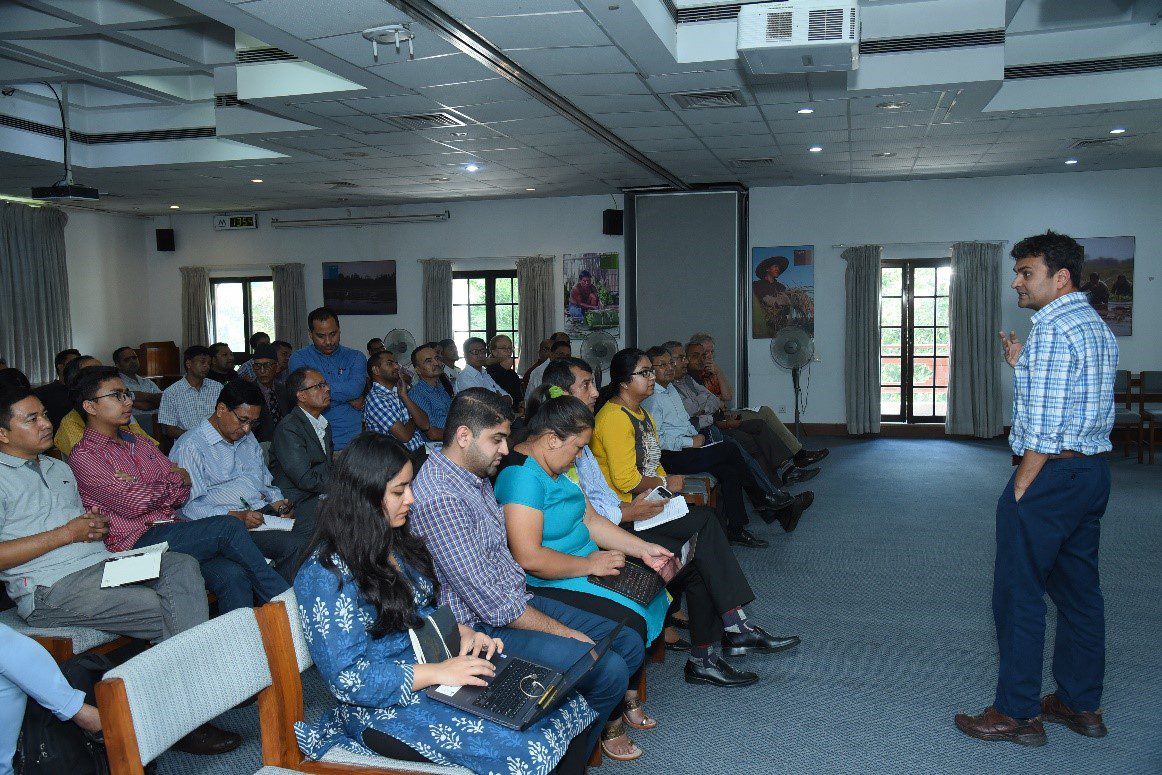This site uses cookies, as explained in our terms of use. If you consent, please close this message and continue to use this site.
Eleven researchers from India, Nepal, and Pakistan gathered in Kathmandu from 5–7 September 2018 to discuss and finalize the findings of their research on benefit sharing from hydropower in their respective countries. Their research was commissioned by the International Centre for Integrated Mountain Development (ICIMOD) with funding from the Department of Foreign Affairs and Trade (DFAT), Government of Australia.
 Researchers participated in a knowledge forum at ICIMOD to share their findings with partners and stakeholders. Imran Khalid, from Pakistan, is pictured responding to a question from the audience about his research findings.
Researchers participated in a knowledge forum at ICIMOD to share their findings with partners and stakeholders. Imran Khalid, from Pakistan, is pictured responding to a question from the audience about his research findings.
These studies were conducted by the Sustainable Development Policy Institute (SDPI), Pakistan; People’s Science Institute (PSI), Dehradun, India; the South Asia Consortium for Interdisciplinary Water Resources Studies (SaciWATERs), Hyderabad, India; Farmer Managed Irrigation Systems Promotion Trust (FMIST), Nepal; and Policy Entrepreneurs Incorporated (PEI), Nepal.
Researchers were looking to answer questions related to how mountain communities located close to hydropower plants are benefiting from hydropower plants and whether there are relevant laws in place to ensure that communities derive commensurate benefits, given that they are most likely to also bear the environmental and social costs of hydropower development. These studies together covered more than 50 hydropower projects in India (Himachal Pradesh, Sikkim, and Arunachal Pradesh), Nepal, and the Upper Indus region in Pakistan.
Hydropower has become the base for a viable economy and sustainable clean energy in countries like Bhutan, India, Nepal, and Pakistan, where there is huge potential for hydropower given the suitable mountain terrain and water resources. However, much needs to be done to address the price that mountain communities pay in the long term when they host such projects in their localities, especially when much of the electricity produced by these projects serves populations downstream without offering enough benefits to mountain communities.
The ICIMOD-commissioned studies look at existing best practices for benefit sharing and how these can be further improved. The research findings highlight some replicable good practices – local area development funds in India or corporate social responsibility (CSR) activities, which include benefits such as free electricity, infrastructure building support, employment, access to market and health services, and plantation programmes in some isolated cases. There are also cases where the culture of benefit sharing is in its early stages as well as instances where local communities have not benefited from hydropower projects.
Some recommendations include the need for countries to revisit their water laws and land acquisition policies, maintain a balance between food security and revenue generation, and explore alternative resources for hydropower plants.
Detailed findings and recommendations made by these four studies will be published later in the year.
Stay up to date on what’s happening around the HKH with our most recent publications and find out how you can help by subscribing to our mailing list.
Sign Up